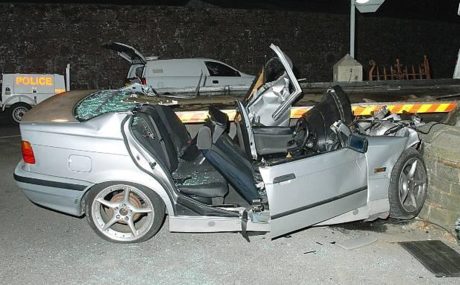Just three days after arriving in Jersey from Poland looking for work, our client sustained a severe brain injury in an accident. The car he was in collided with a breakdown truck at a poorly signed road junction. The driver was killed and our client was airlifted to The Wessex Neurological Centre for life-threatening surgery and Intensive Care.
His mother instructed Stewarts who commenced a claim against the British based insurers AXA in the Jersey Courts. Our report from an expert in accident reconstruction concluded that whilst he was not wearing a seatbelt, the extensive damage to the side of the vehicle he was travelling in meant he was likely to still have sustained a catastrophic injury or even been killed in spite of this. We convinced the insurers to settle the liability issue on a 100% basis – a rare outcome when a seatbelt has not been worn.
We worked with English case managers to set up a brain injury rehabilitation regime far beyond what was otherwise available in Poland and secured AXA’s agreement to a series of interim payments to fund this and a related house purchase. In tandem we appointed a team of English neuro-experts to visit our client and prepare extensive reports on his needs. We also advanced a claim for an approach to valuing future losses supported by two economists, an actuary and a Polish IFA. We appointed Benest Law as our Jersey Advocates and at key stages sought advice initially from Gerard McDermott QC and latterly David Westcott QC.
At a joint settlement meeting in April 2014, the parties bridged the £20 million gap between their respective positions and agreed a settlement package worth in excess of £9 million; partly as a lump sum and partly as annual tax-free and index linked periodical payments. This was the highest damages award for a personal injury claimant in both Jersey and Poland.
Background
1. Helping our client arrange ongoing care and rehabilitation
Our client made a good physical recovery, notwithstanding his very serious injuries and long period in a coma, but was left with serious cognitive and behavioural impairments. Buddy support from a PA was necessary and the cost of this care was a highly contentious issue. The rates paid and claimed far exceeded costs that were more commonly seen for care provided in Poland’s State sector. This issue alone represented approximately 50% of the value of the dispute between the parties.
On our recommendation, an English Case Manager with extensive brain injury experience was engaged to co-ordinate his care and rehabilitation when he returned to his native Poland. As part of our evidence gathering to support his compensation claim, we arranged for experts in neuro-rehabilitation, neuropsychology, neuropsychiatry, care, speech and language therapy and accommodation to visit Poland (twice) to assess his needs as his rehabilitation progressed and independence developed.
We appointed Polish legal agents to obtain an Order from the Polish Family Court concerning his incapacity, appointing his mother Guardian, and obtained subsequent orders approving expenditure from interim payments to purchase a larger house to meet the family’s needs. The house was sub-divided, enabling him to live semi-independently from his parents, supported by PAs. Adopting a consensual approach to resolving the litigation issues convinced the insurer, AXA, to advance these interim payments and fund all other aspects of our client’s rehabilitation and care.
2. Valuing the claim and securing a settlement
Both parties had very different ideas of what a reasonable settlement looked like. Jersey Courts largely follow English common law but they are not bound by English legislation which offers more protection to claimants. Neither the Damages Act 1996, nor the Lord Chancellor’s fixed discount rate of 2.5%, were binding.
We instructed an Actuary, two Economists, and a Polish Investment Advisor to prove that the discount rates would be much lower than those applied in England and should account for future losses that related to earnings. Earnings inflation historically has outstripped prices inflation in the long-term by circa 2%. This argument is in line with the decision of the Court of Appeal and Privy Council in the Guernsey case of Helmot -v- Simon, but we were arguing for even lower discount rates, as our economist advised that that the Polish economy would grow much more rapidly than the English economy and experience greater earnings inflation. We contended for -4.5% discount rates for the future cost of care and our client’s earnings loss. This resulted in a claim for periodical payments of £260,000 totalling in excess of £20 million.
Conversely the defendant’s Counter-Schedule proposed compensation of just £1.3 million based on a +2.5% discount rate. They argued that the Jersey Court should not follow the House of Lords’ decision in Wells -v- Wells which assumed in setting the discount rate that the claimant would invest in ILGS (gilts). They also argued that the Jersey Court have an inherent power to order Periodical Payments.
At a Joint Settlement Meeting in April 2014 the parties managed to agree a settlement – the highest damages award for personal injury claimants in the Jersey jurisdiction. The £9m is payable in part through a generous lump sum and through the first Periodical Payment Order (PPO) to be granted in Jersey’s jurisdiction, linked to a Polish earnings index for care and ASHE 222 for case management.
3. Securing payments for the future
The parties convinced the Jersey Court to ensure the secure continuity of payment based on the Damages Act, despite not being bound by that Act. A lengthy witness statement was obtained from AXA’s Head of Risk & Compliance to demonstrate their strong financial standing.
Unlike in England, there is no financial recourse to the FSCS if an insurer fails to meet its liability under a motor policy. However, recourse can be made to the Motor Insurers Bureau (MIB) who has an agreement covering Jersey. The MIB was invited to raise any objection to the parties’ submissions that, under the terms of the current Agreement, were AXA to default then there would be liability on the MIB’s behalf.
The MIB did object. At a second Hearing in Jersey in February 2015, the Court endorsed the PPO because it was very unlikely that AXA would be unable to meet its future liability. If the MIB Agreement changed in the future, so that they were no longer liable in that scenario, that would be a deemed breach of the Order by AXA and would result in the case coming back before the Courts for further determination.
You can find further information regarding our expertise, experience and team on our International Injury pages.
If you require assistance from our team, please contact us or alternatively request a call back from one of our lawyers by submitting this form.
Media contact: Lydia Buckingham, Senior Marketing Executive, +44 (0) 20 7822 8134, lbuckingham@stewartslaw.com


